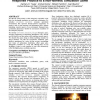Free Online Productivity Tools
i2Speak
i2Symbol
i2OCR
iTex2Img
iWeb2Print
iWeb2Shot
i2Type
iPdf2Split
iPdf2Merge
i2Bopomofo
i2Arabic
i2Style
i2Image
i2PDF
iLatex2Rtf
Sci2ools
137
click to vote
GROUP
2009
ACM
2009
ACM
Emergent team coordination: from fire emergency response practice to a non-mimetic simulation game
We take the work practices of fire emergency responders as the basis for developing simulations to teach team coordination. We introduce non-mimetic simulation: economic operational environments that represent human-centered components of practice, such as team structures and information flows, without mimicking concrete aspects of an environment. Emergent team coordination phenomena validate the non-mimetic simulation of fire emergency response. We develop non-mimetic simulation principles through a game, focusing engagement on information distribution, roles, and the need for decisive real time action, while omitting concrete aspects. We describe the game design in detail, including rationale for design iterations. We take the non-mimetic simulation game design to participants for a series of play sessions, investigating how forms of information distribution affect game play. Participants coordinate as a team and, although they are not firefighters, begin to work together in ways th...
Applied Computing | GROUP 2009 | Non-mimetic Simulation | Team Coordination | Team Coordination Phenomena |
| Added | 28 May 2010 |
| Updated | 28 May 2010 |
| Type | Conference |
| Year | 2009 |
| Where | GROUP |
| Authors | Zachary O. Toups, Andruid Kerne, William A. Hamilton, Alan Blevins |
Comments (0)

